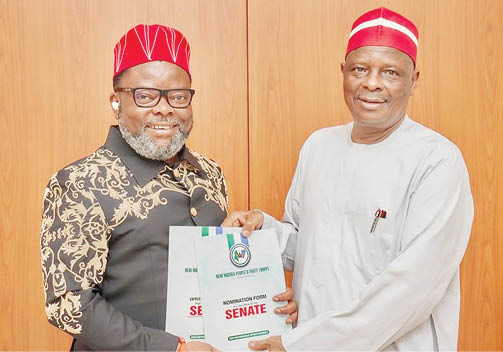As political activities heighten in the country, there are indications that the hitherto little known New Nigeria Peoples Party (NNPP) is emerging as one poised to challenge the dominance of the older ones – the All Progressives Congress (APC) and the Peoples Democratic Party (PDP).
Some analysts are even saying that the party may likely cause an upset close to what the APC did in 2015.
Buhari promises to sign forensics, fraud examiners’ institute bill
Terrorists kill 65 farmers, others in Katsina, Borno attacks
The rising profile of the party is largely attributed to its newfound national leader and a former governor of Kano State, Rabi’u Musa Kwankwaso, who since his defection from the PDP has seen the party gaining more and more popularity.
Kwankwaso who is the leader of the Kwankwasiyya movement, enjoys large followership especially in Kano State. Being a populist also helped to bring it to limelight especially in the northern part of the country.
Followers of the Kwankwasiyya movement, who moved with Kwankwaso to NNPP and the new entrants into the party as well as NNPP members from across the country now see the former governor as a game-changer in a way some political analysts say is akin to how President Muhammadu Buhari was seen from 2003 until recently.
The party has further raised its status in Kano with the recent entrance of another former governor of the state, Senator Ibrahim Shekarau, who also joined from the APC, days after several other lawmakers in the state had joined.
140 visits from 24 states in 20 days to Kwankwaso
In recent weeks, the Miller Road residence of Kwankwaso has become a beehive of activities as new members, aspirants and supporters come in for consultation or endorsement. Our correspondent observed that the visits usually are concluded with a picture with Kwankwaso. It was learnt such pictures are posted on various social media platforms and displayed on posters as evidence that an aspirant has received endorsement from the national leader.
Several of the aspirants believe that their identification with Kwankwaso will be a game-changer for them, with high hope of the NNPP replicating what APC did in 2015.
Our correspondent also learnt that even politicians who are not on the platform of the NNPP have been trooping to Kwankwaso’s Abuja residence, including a governorship aspirant of Kaduna State under the PDP, Shehu Sani.
Daily Trust findings from his social media platforms showed that between May 1 and 20, Kwankwaso has received at least 140 visits from individuals and groups – an average of seven visits a day.
Apart from politicians from his home state of Kano, Kwankwaso has received visitors from at least 24 states within this period, with Katsina, Bauchi, Niger and Nasarawa having the highest number of visitors.
From the South West, politicians have been trooping in from Oyo, Osun and Ekiti, including Engr Popoola Olukayode Joshua, an Oyo State gubernatorial aspirant.
From the southeastern states, Kwankwaso has received visitors from Abia and Imo while from the South South, politicians from Bayelsa, Akwa-Ibom, Rivers and Delta have visited him at his Abuja home. They include Amb. Samuel Brown, a gubernatorial aspirant from Akwa-Ibom as well as senatorial aspirants from Delta – retired Commodore Omatseye Nesiama and Chief Sunny Ofehe.
From the North Central, visitors from Nasarawa, Niger, Kwara, Kogi and Plateau have called and asked Kwankwaso for his blessing. These include Abdullahi Maidoya Yakubu and Nantok Timothy, gubernatorial aspirants from Nasarawa and Plateau, respectively; and Kolo Baba Jiya a senatorial aspirant from Kwara North.
Similarly, gubernatorial, senatorial, House of Representatives and state house of assembly aspirants from Katsina, Jigawa, Kaduna and Kebbi states have been trooping to pledge allegiance and seek his blessing in their ambitions.
From Katsina, Kwankwaso has received Ibrahim Zakari and Engr. Nura Khalil, both gubernatorial aspirants; Mustapha M. Basheer Lamido and Fadila Sani Dalhatu, House of Representatives aspirants among others.
From Jigawa, the gubernatorial candidate of PDP in 2015 and 2019, Aminu Ibrahim Ringim, has since picked the governorship form of the NNPP and also visited Kwankwaso.
Also, Ringim, Tukur Abdullahi Idris and Salisu Isah Maifamfo – aspirants for Gumel, Gagarawa, Sule Tankarkar and Maigatari Federal Constituency – have visited for same reasons.
Also, Ahmad Tijjani Umar, aspirant for Kaduna Central senatorial seat and several other aspirants for federal and state assembly seats have visited for identification and blessings.
Aspirants from Bauchi, Borno, Yobe, Taraba and Gombe states, including Dr. Abdulkarim Karasuwa (gubernatorial aspirant Yobe State), Hon. Khamisu Ahmed Mailantarki (gubernatorial aspirant Gombe State), Mohammed Bashir Sa’idu (Adamawa North senatorial aspirant) and Ishaku Habila Jauro (Yobe South senatorial aspirant) also have also visited.
Dr. Sule Ya’u Sule, the spokesman of Senator Shekarau said his boss decided to join Kwankwaso’s NNPP because of the injustice they suffered in both APC and PDP, adding that as a new party, they are optimistic of getting justice.
He said they also believed the party would present opportunities for credible leaders to rescue Nigeria across the different political levels.
He added that unlike the view of people that Kwankwaso is Shekarau’s political foe and that their recent coming together was nothing beyond a marriage of convenience, “Malam (Shekarau) has never considered anybody as his political foe. You may disagree on certain issues but that does not make you enemies. You may disagree on certain policies but you get to understand yourselves gradually.”
An associate of Kwankwaso, Sanusi Bature, said it was not surprising for those of them in the Kwankwasiyya movement to see aspirants across the nation identifying with his boss, adding that “he is an amiable person loved by many not only in Kano”.
Bature added that as far back as 2019, Kwankwaso had been recognised as the most popular politician in Nigeria. He, however, didn’t state who gave the recognition.
Why politics of identification is strong in Nigeria – Dons
Analysing the development, Professor Kamilu Sani Fage, a political scientist, said Kwankwaso’s increasing influence has not reached the level at which President Buhari operated for the 2015 election because of the view that he was anti-corruption and pro-masses.
“In Kano, yes, he (Kwankwaso) has that influence. I am not ruling out that he has his supporters but outside Kano, it is not like Buhari’s,” he said, adding that the lack of structure and personalities in at least the 24 states in comparison with the bigger parties, which is needed to capture the presidency, may be the albatross for Kwankwaso’s NNPP.
Fage said “Now people don’t try to identify with the Buhari bandwagon for some reasons; one, because he has ran his eight years; two, because of the way he withdrew himself from taking sides on politicking; and because of the challenges of APC government.
“There is no one person currently in Nigerian politics that will have that national appeal for politicians to want to identify with. Politicians now have regional strengths. So, politics of personality will be less in 2023 than the way it was in 2015 and 2019.”
Fage, of the Department of Political Science at Bayero University Kano also said: “The politics is not built around an ideology, programme or nationalistic output.
“So, in the absence of that, they tend to take issues they think will be appealing to the people and identify with them. That is why anything that comes in handy to the politicians, they tend to run with it – be it personality, religion or sectionalism.”
Dr Aminu Hayatu, also of the Department of Political Science in BUK, said rallying around influential politicians is not a new thing in politics.
“People will tend to identify with influential politicians whom they can take advantage of being with, especially when there is government in place that they can benefit from.”
He said that however becomes a problem for such candidates because many of those who rally around them do so to satisfy their selfish political interests; so they can be given the opportunity to contest during an election or benefit from appointments when the government is in power.
“On the other front, the problem, well, it is not like that of Buhari because Buhari got wider appeal and all of that which Kwankwaso does not seem to have. But then of course it is possible people get disappointed when they rally around a single politician. But I think Kwankwaso’s own might be a little bit different from that of Buhari.
“So definitely Kwankwaso has got more political experience and has got more substantial followership, not a kind of kangaroo arrangement that is made before elections like that of Buhari,” Dr Hayatu said.

 Join Daily Trust WhatsApp Community For Quick Access To News and Happenings Around You.
Join Daily Trust WhatsApp Community For Quick Access To News and Happenings Around You.


